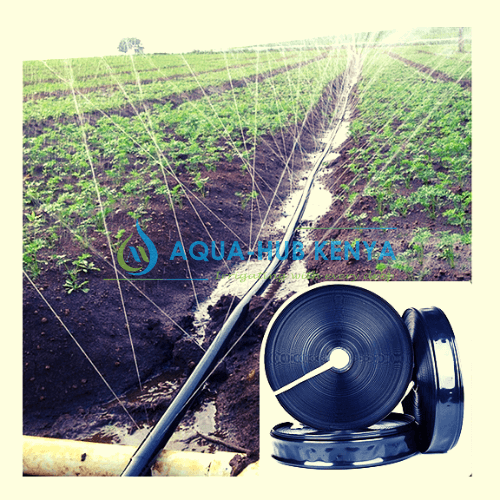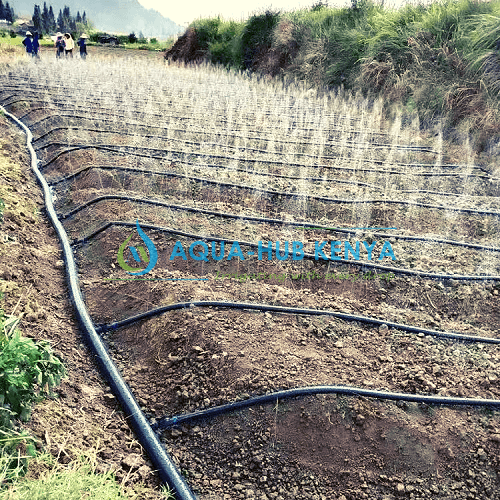Rain hose Irrigation in Kenya

Aqua Hub Provides the best, high-quality and affordable rain hose irrigation in Kenya. Rain hose irrigation is a method of watering crops where delivery of water to the plants is through a system of tubes or hoses. It is a highly efficient method of irrigation that can help farmers conserve water and improve crop yields. In Kenya, drip irrigation is becoming increasingly popular due to the increasing demand for water-efficient irrigation methods. It is particularly well-suitable to smallholder farmers who may have limited access to water. And who are looking for ways to optimize their irrigation practices.
What is the cost of rain hose irrigation in Kenya?
The price of rain hose irrigation depend on various factors such as the size of the farm, the type of soil, the availability of water, and the cost of labor and materials. In general, irrigation systems can be expensive to install and maintain. However, they can also be a cost-effective way to water crops if they are properly designed and managed. The price for our rain hose irrigation systems ranges from Ksh 3,400 to Ksh 5,500.
| Size | Length | Price (Ksh) |
| 32 mm | 50 m | 3,400 |
| 40 mm | 50 m | 4,700 |
| 50 mm | 50 m | 5,500 |
What are the benefits of rain hose irrigation system

- Water conservation: Rain hose irrigation can help to reduce water usage. This is because it delivers water directly to the roots of plants. Therefore, reducing the amount of water lost to evaporation and runoff.
- Increased crop yields: This is because rain hose irrigation provides a consistent and controlled supply of water to plants.
- Reduced disease risk: Rain hose irrigation reduces the amount of water that comes into contact with plant leaves, which can help to reduce the risk of diseases caused by fungal infections.
- Increased efficiency: Rain hose irrigation systems can be programmed to deliver water at specific intervals. Thus making it easier to manage irrigation schedules and ensuring that plants receive the right amount of water at the right time.
- Flexibility: Rain hose irrigation systems can be easily suitable to different types of crops and soil conditions, making them a flexible irrigation option.
- Labor savings: Rain hose irrigation systems can save time and labor because they do not require manual watering of plants.
- Environmental benefits: Rain hose irrigation can help to reduce the amount of water used for irrigation, which can help to preserve water resources and reduce the impact of irrigation on the environment.
What are the components of rain hose system?

- Water source: This can be a well, a river, a lake, or a public water supply.
- Pump: This is applicable to lift water from the water source and deliver it to the irrigation system.
- Control valve: This is used to regulate the flow of water from the pump to the irrigation system.
- Filters: These are used to remove dirt and other contaminants from the water before it is delivered to the irrigation system.
- Mainline: This is the main water supply line that carries water from the pump to the irrigation system.
- Submain: This is a smaller water supply line that branches off from the mainline and carries water to specific areas of the irrigation system.
- Emitters: These are small devices that release water from the rain hose onto the plants. Emitters can be either pressure-compensating (which maintain a consistent flow rate regardless of pressure variations) or non-pressure-compensating (which deliver more water at higher pressures and less water at lower pressures).
- Rain hose: This is a flexible tube or hose that carries water from the emitter to the plants. Rain hoses can be either on the surface of the soil or buried underground.
- End caps: These are used to seal the ends of the rain hose to prevent water from leaking out.
- Flushing valves: These are used to flush out the irrigation system to remove any dirt or debris that may have accumulated.
- Fertilizer injectors: These are optional components that can be used to deliver fertilizers or other chemicals to the plants through the irrigation system.
Get high quality Rain hose Irrigation systems from Aqua Hub Kenya. We provide different types of Rain hose Irrigation systems as per your needs. For more information, please contact us at: 0790719020 NAIROBI | 0759372241 ELDORET
